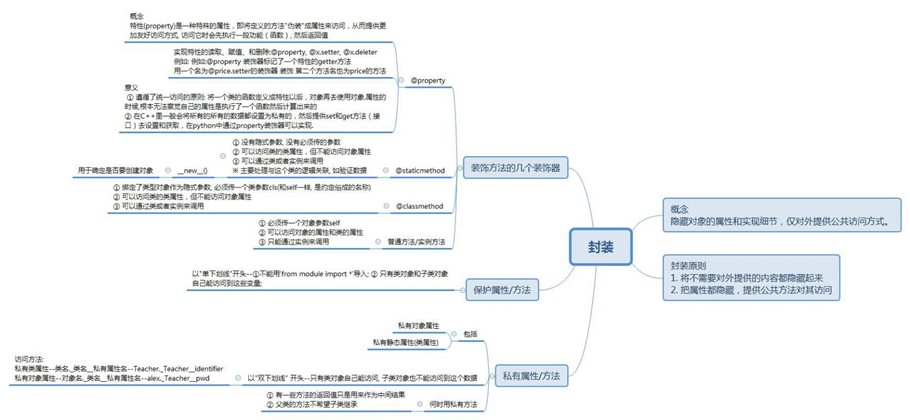二十四. Python基础(24)--封装
● 知识结构
|
|
● 类属性和__slots__属性
class Student(object): grade = 3 # 也可以写在__slots__属性下面__slots__下面
def __init__(self, name, age, hobby): self.name=name self.age=age # self.hobby=hobby # 如果定义了这个对象属性, 会抛出异常: AttributeError: 'Student' object has no attribute 'hobby'
a=Student('Arroz', 22,'swimming') b=Student('Paul', 30,'skating') print(Student.grade) # 3 print(a.grade) # 3, 类和对象都可以访问静态属性/类属性 a.grade = 5 # 此时没有定义__slos__属性, 类属性grade可写 print(a.grade) # 5 print(b.grade) # python的类变量和C++的静态变量不同,并不是由类的所有对象共享。 # 如果是在C++中, 如果某一个对象修改了静态属性, 其它对象的静态属性(实际上是同一个静态属性)也将改变 print(a.__dict__) # {'name': 'Arroz', 'age': 22, 'grade': 5}
class Student(object): grade = 3 # 也可以写在__slots__属性下面__slots__下面 __slots__ = ['name', 'age'] # 限定可以定义的对象属性为name, age
def __init__(self, name, age, hobby): self.name=name self.age=age # self.hobby=hobby # 如果定义了这个对象属性, 会抛出异常: AttributeError: 'Student' object has no attribute 'hobby'
a=Student('Arroz', 22,'swimming') b=Student('Paul', 30,'skating') print(Student.grade) print(a.grade) # 类和对象都可以访问静态属性/类属性 #a.grade = 5 # 此时定义了__slos__属性, 类属性grade只读: # a.grade = 5 # 此时没有定义__slos__属性, 类属性grade可写 print(a.grade) print(b.grade) # print(a.__dict__) # 'Student' object has no attribute '__dict__' print(dir(a)) # 如果在一个类中添加了__slots__属性,那么这个类的实例将不会拥有__dict__属性 # 但是dir()仍然可以找到并列出它的实例所有有效属性。 |
● 类的特性
class Shop: discount = 0.5 # 打五折
def __init__(self,name, price): self.name = name self.__price = price
@property # The @property decorator marks the getter method of a property (@property装饰器标志了一个特性的getter方法) def price(self): return self.__price * Shop.discount
@price.setter def price(self, new_price): self.__price = new_price
@price.deleter def price(self): del self.__price
apple = Shop('apple', 5) # print(apple.__price) # AttributeError: 'Shop' object has no attribute '__price' print('discount:', Shop.discount) #discount: 0.5 print('discount:', apple.discount) #discount: 0.5 print('__price:', apple._Shop__price) # __price: 5 print(apple.price) # 3.75 (调用getter方法) apple.price = 6 # (因为有等号, 所有调用setter方法) print(apple.price) # 4.5 print(apple.__dict__) # {'name': 'apple', '_Shop__price': 6} del apple.price # 调用deleter方法 print(apple.__dict__) # {'name': 'apple'} |
# 有关删除属性 class A: pass
a = A() a.name = 'Arroz' print(a.name) # Arroz del a.name # 删除属性 # print(a.name) # AttributeError: 'A' object has no attribute 'name' |
● 什么时候用静态方法
class Parent: def __method1(self): print('Foo')
class Son(Parent): def __method2(self): print('Son')
def fun(self): return self.__method2() # return关键字可以省略, 返回值, 即__method2()时中间结果
son = Son() son.fun() # Son
# 什么时候用私有方法? #1.有一些方法的返回值只是用来作为中间结果 #2.父类的方法不希望子类继承 |
● 静态方法 & 类方法
class Foo: val1=5 def __init__(self, value): self.val2 = value
@staticmethod def staticfunc(): Foo.val1 = 10 # 可以访问类属性 # 无法访问对象属性
@classmethod def classfunc(cls): cls.val1 = 15 # 可以访问类属性 # 无法访问对象属性
Foo.staticfunc() print(Foo.val1) #10 Foo.classfunc() print(Foo.val1) #15 |
静态方法 和 类方法都可以操作类本身,为什么还要在发明一个类方法? ① 静态方法是通过类名来操作类属性的, 这是写死在程序中, 而类方法是通过类型参数来操作类属性的 ② 如果子类继承了使用静态方法的类,那么子类继承的静态方法还是在操作父类, 子类需要重写静态方法才能操作子类(也就是需要重写成用子类名来操作类属性) ③ 类方法如果被继承, 那么类型参数会传入子类本身, 也因此, 子类不需要重写类方法(因为cls指本类) |
● 命名元祖
#命名元祖: 没有方法、 并且不能改变属性值的类 from collections import namedtuple Point = namedtuple('point',['x','y']) t1 = Point(1,2) print(t1.x, t1.y) # t1.x=3 # AttributeError: can't set attribute |

